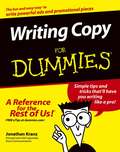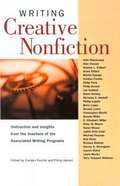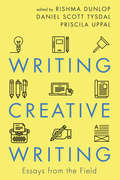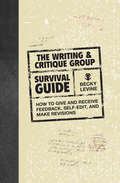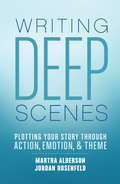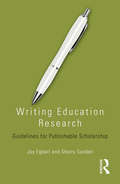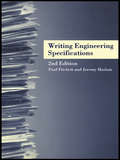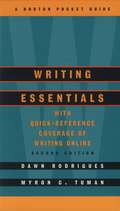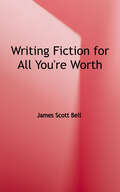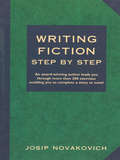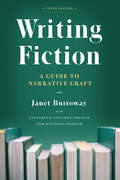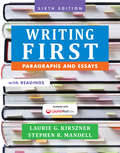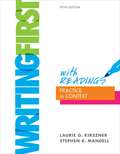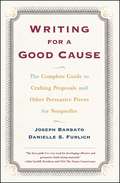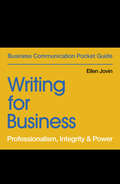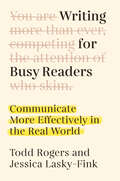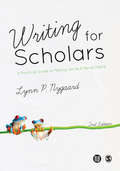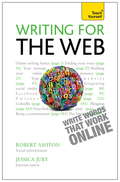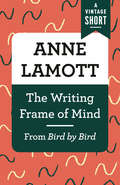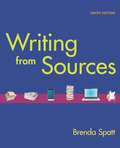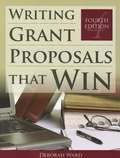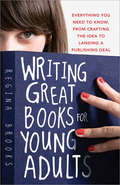- Table View
- List View
Writing Copy For Dummies
by Jonathan KranzTips on writing to consumers and business-to-business Create captivating, results-oriented, sales-generating copy Need to produce winning copy for your business? This fast, fun guide takes you through every step of a successful copywriting project, from direct mail, print ads, and radio spots to Web sites, articles, and press releases. You'll see how to gather crucial information before you write, build awareness, land sales, and keep customers coming back for more. Discover How To: * Write compelling headlines and body copy * Turn your research into brilliant ideas * Create motivational materials for worthy causes * Fix projects when they go wrong * Land a job as a copywriter
Writing Creative Nonfiction: Instruction and Insights from the Teachers of the Associated Writing Program
by Carolyn Forché Philip GerardExperience the power and the promise of working in today' most exciting literary form: Creative Nonfiction Writing Creative Nonfiction presents more than thirty essays examining every key element of the craft, from researching ideas and structuring the story, to reportage and personal reflection. You'll learn from some of today's top creative nonfiction writers, including: Terry Tempest Williams - Analyze your motivation for writing, its value, and its strength. Alan Cheuse - Discover how interesting, compelling essays can be drawn from every corner of your life and the world in which you live. Phillip Lopate - Build your narrator–yourself–into a fully fleshed-out character, giving your readers a clearer, more compelling idea of who is speaking and why they should listen. Robin Hemley - Develop a narrative strategy for structuring your story and making it cohesive. Carolyn Forche - Master the journalistic ethics of creative nonfiction. Dinty W. Moore - Use satire, exaggeration, juxtaposition, and other forms of humor in creative nonfiction. Philip Gerard - Understand the narrative stance–why and how an author should, or should not, enter into the story. Through insightful prompts and exercises, these contributors help make the challenge of writing creative nonfiction–whether biography, true-life adventure, memoir, or narrative history–a welcome, rewarding endeavor. You'll also find an exciting, creative nonfiction "reader" comprising the final third of the book, featuring pieces from Barry Lopez, Annie Dillard, Beverly Lowry, Phillip Lopate, and more–selections so extraordinary, they will teach, delight, inspire, and entertain you for years to come!
Writing Creative Writing: Essays from the Field
by Rishma Dunlop Daniel Scott Tysdal Priscila UppalEssential and engaging essays about the joys and challenges of creative writing and teaching creative writing by a host of Canada’s leading writers. Writing Creative Writing is filled with thoughtful and entertaining essays on the joys and challenges of creative writing, the complexities of the creative writing classroom, the place of writing programs in the twenty-first century, and exciting strategies and exercises for writing and teaching different genres. Written by a host of Canada’s leading writers, including Christian Bök, Catherine Bush, Suzette Mayr, Yvette Nolan, Judith Thompson, and thom vernon, this book is the first of its kind and destined to be a milestone for every creative writing student, teacher, aspirant, and professional.
The Writing & Critique Group Survival Guide: How to Make Revisions, Self-Edit, and Give and Receive Feedback
by Becky LevineTrying to Finish Your Book? There's Strength in Numbers Whether you're trying to revise your novel or polish up an article to pitch to magazines, it pays to have a few sets of eyes look over your work. But, how can you be sure you're getting an unbiased and objective opinion? A writing critique group may be the answer you're looking for, and this book arms you with everything you need to find a group that suits your specific writing needs. Whether you're looking to join an existing group or start one of your own, you'll learn how to: Find compatible critique partners Develop your "editor's eye" and analyze writing like a professional Construct organized and well thought-out critiques Give and receive constructive feedback Run efficient critique meetings and maintain a good group dynamic Apply the feedback you receive to your own writing and make revisions Complete with worksheets, sample critiques and examples,The Writing & Critique Group Survival Guidegives you tools to hone your editing skills and deepen your understanding of how to revise your own work as well as someone else's. With the help of this guide your writing critique group can be a helpful resource for you and your writing partners for years to come.
Writing Deep Scenes: Plotting Your Story Through Action, Emotion, and Theme
by Martha Alderson Jordan RosenfeldTake a Deep Dive into Plot and Scene and Improve Your WritingWhether you're planning your first novel or have already written a first draft, you need to master the concepts of plot and scene to truly realize your story's potential. Writing Deep Scenes teaches you how to write strong, layered, and engaging scenes--the secret to memorable, page-turning plots. It's filled with practical tools for building layers and nuance into your scenes, employing the right scene types at the right junctures, and developing a profound understanding of how plot and scene intertwine.Inside you'll learn:How scenes are comprised of three key layers: action, emotion, and theme.How to recognize each layer and weave them seamlessly into a scene.How to develop an intricate relationship between the action and emotion in every scene.How thematic imagery embedded in scenes increases a story's tension and contributes to the story's meaning.Using contemporary examples from a variety of genres, Writing Deep Scenes provides an effective method for plotting at the scene level. Use these techniques and enrich your fiction and memoirs with page-turning suspense and pathos, and explore new depths in every story you write.
Writing Doesn't Have To Be Lonely: 14 Ways to Get the Help of Other People When You Write
by Lawrence WeinsteinOne big reason many people dread to write is that their writing habits don't satisfy their inborn need for company. For many, their writing will go best when they alternate the solitary times with times of companionship and sharing.<P> This is not a book just about the company and help available for writing at school, either. The array of types of help described here should prove valuable in any environment.
Writing Education Research: Guidelines for Publishable Scholarship
by Joy Egbert Sherry SandenFor both new academics and those with some experience, writing articles of publishable quality can be particularly challenging. Developing the necessary skill set requires useful information, hard work, and the type of direction infrequently offered in research methods courses, leaving researchers to piece together resources on their own. This book addresses this critical topic in a format that is easy to teach and understand. It is a practical volume that teaches researchers how to identify their audience, clearly state the nature of their work, provide exceptional literature reviews, cite appropriately, and explicate their research. Beginning each chapter with reviewer comments, Writing Education Research is designed to help scholars understand both how to write effective research reports and how to get published. Practice exercises and resource lists in each chapter offer easy-to-access information about the review and publication process. A perfect accompaniment to standard research courses, this practical book demystifies the writing process for anyone looking to publish articles, chapters, or papers in education.
Writing Engineering Specifications
by Paul Fitchett Jeremy HaslamEngineers need to understand the legal and commercial context in which they draw up technical specifications. This thoroughly up-dated edition of Haslam's successful Writing Engineering Specifications provides a concise guide to technical specifications and leads the reader through the process of writing these instructions, with clear advice to help the student and professional avoid legal disputes or the confusion and time wasting caused by poor drafting. Designers and project managers should find this invaluable, and it should be helpful to insurers, lawyers, estimators and the like.
Writing Essentials: A Norton Pocket Guide
by Dawn Rodriguez Myron C. TumanWriting Essentials combines the essentials of grammar, punctuation, mechanics, and documentation with practical suggestions for writing online.<P> From online prewriting, drafting, group workshopping, revising, and editing, to database searching, navigating the Internet, documenting online sources, and designing documents, Writing Essentials offers practical, hands-on advice for using computers throughout the writing process.
Writing Fiction for All You're Worth
by James Scott BellTake your fiction to that next level, where agents and editors sit up and take notice - and where readers keep coming back for more! This book contains the best of James Scott Bell's articles and blog posts on writing, easily searchable under these headings: The Writing World, The Writing Life, and The Writing Craft. And you'll get never before published material, including a first-ever look into Jim's secret writing notebook, the manual he put together over the years for his own use in writing numerous bestsellers. For the first time he's sharing a glimpse into the notes he compiled on his way to publishing success. Plus, a special module on getting into e-publishing, which is a must read if you want to have a career selling e-books successfully.
Writing Fiction Step by Step: An Award-Winning Author Leads You Through More than 200 Exercises Enabling You to Complete a Story or Novel
by Josip NovakovichWriting Fiction Step by Step gives you more than 200 exercises that will sharpen your writing skills while helping you develop complete short stories, even novels. In this sequel to his very popular Fiction Writer's Workshop, Whiting Award-winning author Josip Novakovich shows you that writing fiction is about making connections–between character and plot, setting and conflict, memory and imagination. You'll make these connections by linking the exercises. A character invented in chapter two can appear in a scene outlined in chapter eight and can speak in a voice developed in chapter ten. Embark on a unique writing journey and learn step by step how to craft fiction that captivates readers.
Writing Fiction, Tenth Edition: A Guide to Narrative Craft (Chicago Guides to Writing, Editing, and Publishing)
by Janet Burroway Elizabeth Stuckey-French Ned Stuckey-FrenchMore than 250,000 copies sold! A creative writer’s shelf should hold at least three essential books: a dictionary, a style guide, and Writing Fiction. Janet Burroway’s best-selling classic is the most widely used creative writing text in America, and for more than three decades it has helped hundreds of thousands of students learn the craft. Now in its tenth edition, Writing Fiction is more accessible than ever for writers of all levels—inside or outside the classroom. This new edition continues to provide advice that is practical, comprehensive, and flexible. Burroway’s tone is personal and nonprescriptive, welcoming learning writers into the community of practiced storytellers. Moving from freewriting to final revision, the book addresses “showing not telling,” characterization, dialogue, atmosphere, plot, imagery, and point of view. It includes new topics and writing prompts, and each chapter now ends with a list of recommended readings that exemplify the craft elements discussed, allowing for further study. And the examples and quotations throughout the book feature a wide and diverse range of today’s best and best-known creators of both novels and short stories. This book is a master class in creative writing that also calls on us to renew our love of storytelling and celebrate the skill of writing well. There is a very good chance that one of your favorite authors learned the craft with Writing Fiction. And who knows what future favorite will get her start reading this edition?
Writing First with Readings
by Laurie G. Kirszner Stephen R. MandellBest-selling authors and veteran college writing instructors Laurie Kirszner and Stephen Mandell believe that students learn to write best when they use their own writing as a starting point. In Writing First with Readings: Paragraphs and Essays, the authors take a simple yet effective approach to helping students improve their writing skills: visual writing prompts open every chapter and get students writing immediately. Then, throughout the chapter, students move between their own writing, writing models and instruction, and workbook-style mastery exercises so that they continually revise, rewrite, and improve their own writing. It is this formula that makes writing instruction meaningful and accessible for students. Thoughtful chapters on academic writing and success, research, and critical reading, along with high-interest essays, round out this new edition, making it the perfect introduction to college writing.
Writing First With Readings: Practice In Context
by Laurie G. Kirszner Stephen R. MandellBest-selling authors and veteran college writing instructors Laurie Kirszner and Stephen Mandell believe that students learn to write best when they use their own writing as a starting point. In Writing First with Readings: Practice in Context, designed for the paragraph to essay course, Kirszner and Mandell take seriously the ideas and expressive abilities of developmental students, as well as their need to learn the rules of writing and grammar. Visual writing prompts that open every chapter get students writing immediately. By moving frequently between their own writing, writing models and instruction, and workbook-style mastery exercises, students get constant reinforcement of the skills they are learning. Thoughtful chapters on college success, research, and critical reading, along with high-interest essays, round out the text, making it the perfect introduction to college writing.
Writing For a Good Cause
by Joseph Barbato Danielle FurlichFilled with tips and survival skills from writers and fund-raising officers at nonprofits of all sizes, Writing for a Good Cause is the first book to explain how to use words well to win your cause the money it needs. Whether you work for a storefront social action agency or a leading university, the authors' knowledgeable, practical advice will help you: Write the perfect proposal -- from the initial research and interviews to the final product Draft, revise, and polish a "beguiling, exciting, can't-put-it-down and surely can't-turn-it-down" request for funds Create case statements and other big money materials -- also write, design, and print newsletters, and use the World Wide Web effectively Survive last-minute proposals and other crises -- with the Down-and-Dirty Proposal Kit! Writing for a Good Cause provides everything fund raisers, volunteers, staff writers, freelancers, and program directors need to know to win funds from individual, foundation, and corporate donors.
Writing for Business: Professionalism, Integrity & Power (Business Communication Pocket Guides)
by Ellen JovinBuild essential skills and write with confidence at work! Immediately practical guide to better business writing designed to help you develop a clear, direct, natural communication style that supports rather than obscures what you want to say. It covers writing principles relevant for a wide range of business documents, including email, letters, memos, reports, proposals, and more, while also offering editing tips to ensure you come across as professional and polished. Packed with examples and tips straight from the workplace.
Writing for Busy Readers: Communicate More Effectively in the Real World
by Todd Rogers Jessica Lasky-FinkWriting well is for school. Writing effectively is for life. Todd Rogers and Jessica Lasky-Fink offer the most valuable practical writing advice today. Building on their own research in behavioral science, they outline cognitive facts about how people actually read and distill them into six principles that will transform the power of your writing: Less is moreMake reading easyDesign for easy navigationUse enough formatting, but no moreTell readers why they should careMake responding easyIncluding many real-world examples, a checklist and other tools, this guide will make you a more successful and productive communicator. Rogers and Lasky-Fink bring Strunk and White&’s core ideas into the twenty-first century&’s attention marketplace. When the influential guides to writing prose were written, the internet hadn&’t been invented. Now, the average American adult is inundated with digital messages each day. With all this correspondence, capturing a busy reader&’s attention is more challenging than ever. This is how to do it.
Writing for Scholars: A Practical Guide to Making Sense & Being Heard
by Lynn NygaardLecturers request your electronic inspection copy here. Academics are not just researchers, but writers too. Using her many years of practical experience gained as a teacher and editor, Lynn Nygaard guides you through the whole process of writing and presenting your research in order to help you make your voice heard within the academic community. Grounded in real world advice rather than abstract best practice, Nygaard demonstrates a number of approaches to writing in order to help you identify those most suited to your own project. This updated new edition includes: Revised and expanded sections in each chapter More focus on the social sciences A more international focus Updated discussions on publishing practices Annotated biographies for each chapter New illustrations and images Additional practical tips and exercises From defining your audience, to forming your argument and structuring your work, this book will enable you to communicate your research passionately and professionally. Lynn Nygaard is Special Adviser on Project Development and Publications at the Peace Research Institute Oslo (PRIO). Visit the companion website for additional online resources! SAGE Study Skills are essential study guides for students of all levels. From how to write great essays and succeeding at university, to writing your undergraduate dissertation and doing postgraduate research, SAGE Study Skills help you get the best from your time at university. Visit the SAGE Study Skills hub for tips, resources and videos on study success! This updated new edition includes: Revised and expanded sections in each chapter More focus on the social sciences A more international focus Updated discussions on publishing practices Annotated bibliographies for each chapter New illustrations and images Additional practical tips and exercises From defining your audience, to forming your argument and structuring your work, this book will enable you to communicate your research passionately and professionally.
Writing for Scholars: A Practical Guide to Making Sense & Being Heard
by Lynn NygaardAcademics are not just researchers, but writers too. Using her many years of practical experience gained as a teacher and editor, Lynn Nygaard guides you through the whole process of writing and presenting your research in order to help you make your voice heard within the academic community. Grounded in real world advice rather than abstract best practice, Nygaard demonstrates a number of approaches to writing in order to help you identify those most suited to your own project. This updated new edition includes: Revised and expanded sections in each chapter More focus on the social sciences A more international focus Updated discussions on publishing practices Annotated biographies for each chapter New illustrations and images Additional practical tips and exercises From defining your audience, to forming your argument and structuring your work, this book will enable you to communicate your research passionately and professionally. Lynn Nygaard is Special Adviser on Project Development and Publications at the Peace Research Institute Oslo (PRIO). Companion Website study.sagepub.com/nygaardwritingforscholars Visit the companion website for additional online resources! This updated new edition includes: Revised and expanded sections in each chapter More focus on the social sciences A more international focus Updated discussions on publishing practices Annotated bibliographies for each chapter New illustrations and images Additional practical tips and exercises From defining your audience, to forming your argument and structuring your work, this book will enable you to communicate your research passionately and professionally.
Writing for the Web: Teach Yourself
by Robert Ashton Jessica JubyLike it or not, the internet has become integral to every aspect of our lives, with smart phones, tablet computers and wifi enabling us to communicate easily and instantly.Whether you're a rising star in the corporate world or a silver surfer, to make an impactonline you have to be able to write clearly, convincingly and in a way that emphasisesyour character too. Best-selling business author Robert Ashton and internet native JessJuby will help you communicate more objectively and effectively online, both at work andat home.
Writing for the Web: Teach Yourself
by Robert Ashton Jessica JubyLike it or not, the internet has become integral to every aspect of our lives, with smart phones, tablet computers and wifi enabling us to communicate easily and instantly.Whether you're a rising star in the corporate world or a silver surfer, to make an impactonline you have to be able to write clearly, convincingly and in a way that emphasisesyour character too. Best-selling business author Robert Ashton and internet native JessJuby will help you communicate more objectively and effectively online, both at work andat home.
The Writing Frame of Mind: From Bird by Bird (A Vintage Short)
by Anne LamottA Vintage Shorts selection. To the enormous challenges of being a writer, Anne Lamott offers invaluable advice and encouragement, which more than a million scribes and scribblers of all ages and abilities have been inspired by for a quarter century. In this selection from her essential volume, Bird by Bird, Lamott tenderly recommends and outlines the qualities that every writer should learn to hone: intuition, attention, morality, and more. An ebook short.
Writing from Sources
by Brenda SpattThorough and practical, Writing from Sources is an indispensable guide to source-based composition. Using a skills-based approach, students begin with the building blocks of research writing—annotating a passage and summarizing a source—then progress through more complex steps, such as synthesizing multiple sources and writing a full-length research essay. Along the way, dozens of readings by professional writers and clear, helpful exercises provide models for practice and proficiency. Known for its clear and helpful advice, Writing from Sources teaches the fundamentals of research writing that students will use throughout their college careers.
Writing Grant Proposals That Win
by Deborah WardThe Fourth Edition is a thorough update with all new charts, graphs, tables, and figures; as well as new examples and coverage of current topics. Students will come away with a clear understanding of how reviewers function and what they are looking for in proposal sections, in addition to what is needed to maximize every aspect of the proposal. The text is loaded with useful tips that will enable your students to hit the ground running, including how to assess a program announcement and ensure each requirement is addressed; condense your entire proposal into a brief but compelling abstract; determine what appendices to include (and in what form) for maximum impact; adequately describe project dissemination and continuation plans; use technology -- including desktop publishing, graphics, color, and spreadsheets for budget development -- to enhance your proposals; and structure your proposal to increase your chance of winning.
Writing Great Books for Young Adults
by Regina BrooksFrom a top young adult literary agent, Writing Great Books for Young Adults is the only guide on how to write for young adults and gives writers the advice they need to tap this incredible market.
